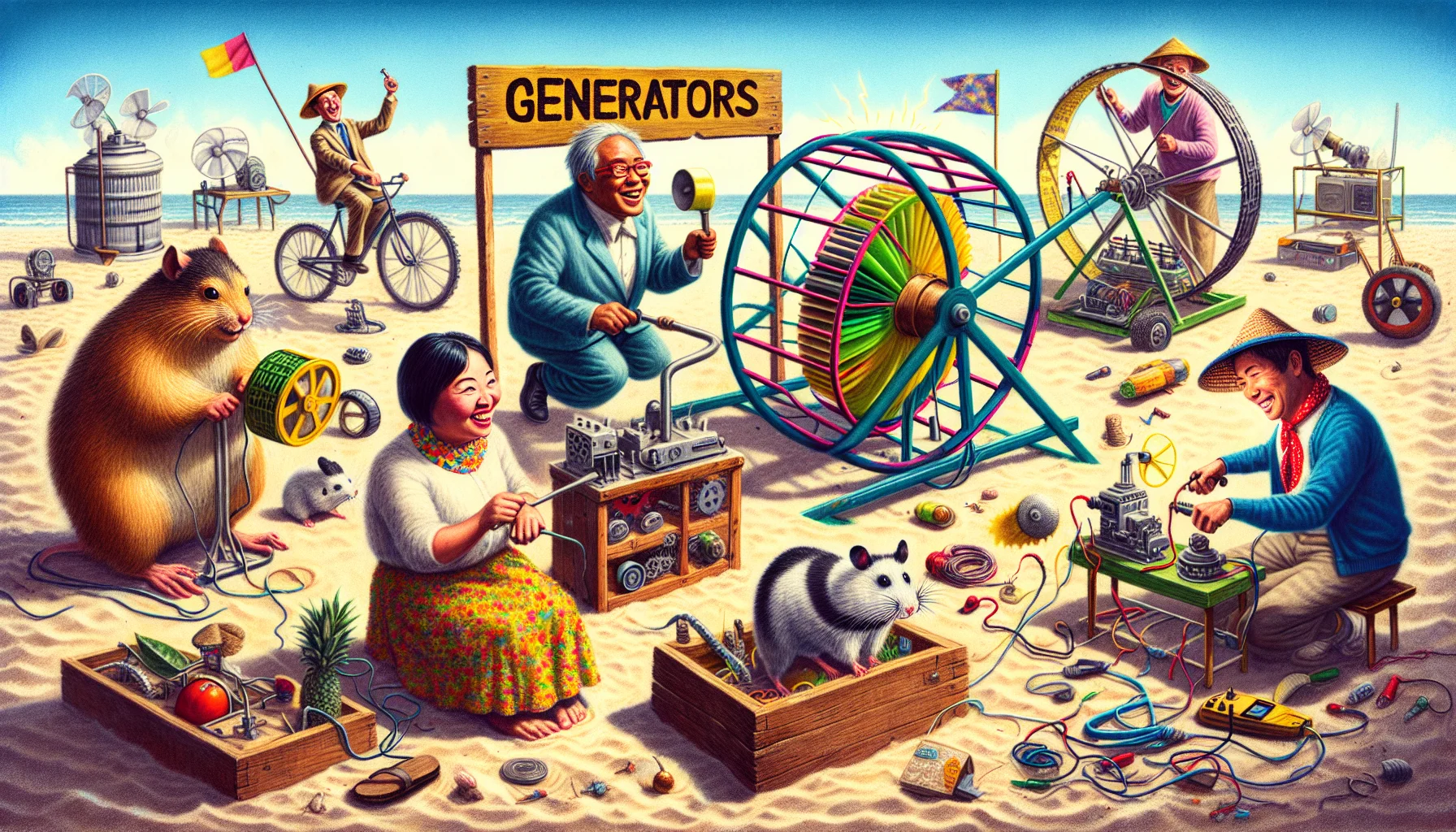Generators Category Quiz
Test Your Knowledge
Question of
Understanding Generators: An Introduction
Generators are devices that convert mechanical energy into electrical energy, playing a crucial role in producing electricity for various applications. This conversion process is based on the principles of electromagnetic induction, where a conductor moving in a magnetic field induces a voltage. The mechanical energy required to move the conductor can come from different sources, including steam turbines, water turbines, internal combustion engines, and even hand cranks. Generators are essential in providing power for homes, businesses, and industries, especially in areas without direct access to the electrical grid. They also serve as critical backup power sources during outages, ensuring that essential services and functions can continue uninterrupted.
Types of Generators
- Portable Generators: These are small, mobile units that can provide temporary electrical power. They are ideal for camping, job sites, and emergency power outages.
- Inverter Generators: These generators are known for their quiet operation and efficiency. They produce AC power, convert it to DC, and then back to clean AC power, which is ideal for sensitive electronic devices.
- Standby Generators: Standby generators are permanently installed outside a home or business and automatically turn on during a power outage. They are connected to a fuel source, such as natural gas or propane, to provide continuous power.
- Industrial Generators: These are large-scale generators designed for industrial applications. They can provide a significant amount of power and are typically used in manufacturing plants, large commercial facilities, and for utility applications.
How Do Generators Work?
Generators function on the principle of electromagnetic induction, which involves the conversion of mechanical energy into electrical energy. This process starts when a power source moves a turbine, which in turn spins a rotor (a series of magnets) inside a stator (a coil of wires). As the rotor spins, its magnetic field moves past the stator, causing electrons in the wire to move and generate an electric current. Essentially, the mechanical energy supplied by the turbine—often derived from various sources like steam, water, wind, or gas—is transformed into electrical energy that can be used to power homes, businesses, and equipment.
Choosing the Right Generator for Your Needs
When it comes to selecting a generator, there are several key factors you should consider to ensure you choose the right one for your needs. First and foremost, consider your power requirements; determine the total wattage of the appliances and devices you need to power during an outage. Next, think about fuel type, as generators can run on gasoline, diesel, propane, or natural gas, each with its own advantages and disadvantages. Lastly, portability is an important factor if you plan to use your generator in various locations or need to move it regularly. Taking these factors into account will help you make an informed decision and select a generator that best fits your requirements.
Safety Tips for Using Generators
- Always read and follow the manufacturer's instructions before operating a generator.
- Operate generators in well-ventilated areas outside, away from windows, doors, and vents to prevent carbon monoxide poisoning.
- Never use a generator inside homes, garages, basements, or any enclosed or partially enclosed areas.
- Install battery-operated or plug-in (with battery backup) carbon monoxide alarms in your home, following manufacturer’s installation instructions.
- Do not overload the generator. Be mindful of the rated capacity and do not exceed the recommended load.
- Ensure the generator is placed on a stable surface to avoid tipping over during operation.
- Keep the generator dry and do not use in rain or wet conditions. Operate on a dry surface under an open, canopy-like structure.
- Store fuel for the generator in a correctly labeled, non-glass safety container. Store the containers outside of living areas and away from the generator or fuel-burning appliances.
- Before refueling, turn off the generator and let it cool down. Gasoline spilled on hot engine parts could ignite.
- Keep children and pets away from the generator to avoid accidents.
- Regularly inspect your generator for any signs of wear and tear or damage and ensure timely maintenance.
- Use heavy-duty, outdoor-rated extension cords that are in good condition and rated in watts or amps equal to or greater than the sum of the connected appliance loads.
The Future of Generators
The landscape of generator technology is witnessing transformative changes, driven by the urgent need for sustainable and efficient energy solutions. A significant trend is the shift towards renewable energy sources, with solar-powered and wind-powered generators becoming increasingly prevalent. These advancements not only promise to reduce our carbon footprint but also enhance energy security by diversifying sources. Furthermore, innovations in generator design and materials are leading to higher efficiency levels and reduced environmental impact. The integration of smart technologies allows for more precise control and monitoring, optimizing performance while minimizing waste. As we move forward, the focus on renewable resources and technological improvements underscores a future where generators play a pivotal role in achieving a balance between meeting energy demands and preserving our planet.
Conclusion: The Importance of Generators
Generators play a pivotal role in ensuring the availability of reliable power across diverse settings, ranging from residential areas to industrial complexes. They serve as an indispensable backup during power outages, natural disasters, and other emergencies, safeguarding against the interruption of daily activities and operations. Furthermore, generators contribute significantly to modern living and productivity by providing a continuous power supply, thus enabling progress and convenience in various aspects of life and work.












